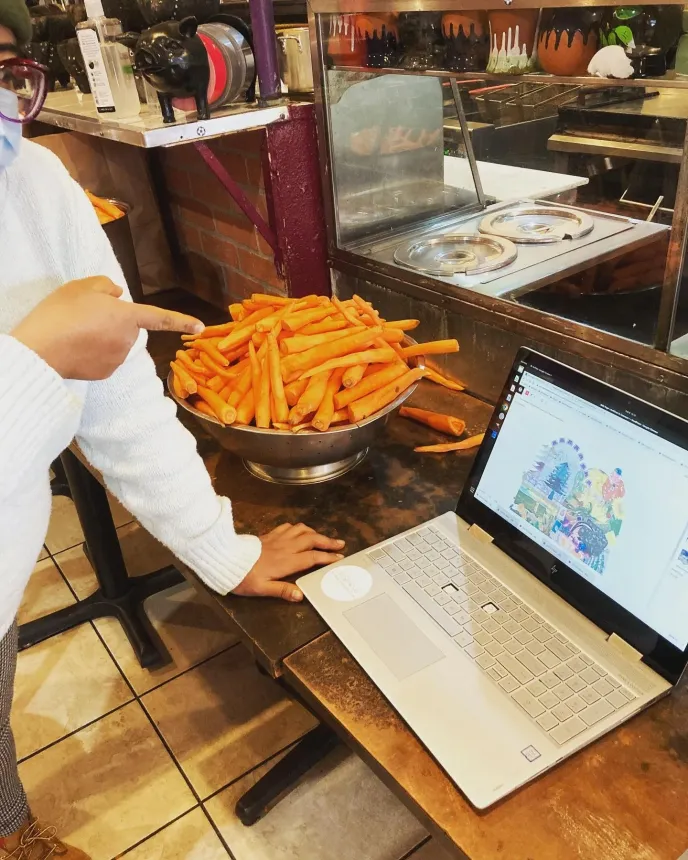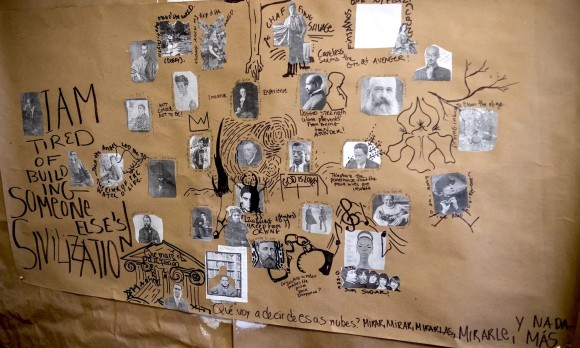Archives in Common

Peeling carrots and working on the Mutual Aid Timeline at La Morada. Image courtesy of Ángeles Donoso Macaya.
On the table: a laptop with a website editor program page open; two pots, one with peeled carrots, a second one with carrots to be peeled; two peelers. Sitting by the table are Yajaira Saavadra, co-owner of La Morada (an undocumented-owned and family-run Oaxacan restaurant located in the South Bronx), and me, a volunteer of La Morada’s Mutual Aid Kitchen for the past year and Faculty Lead of the project “Archives in Common: Migrant Practices / Knowledge / Memory” at The Center for the Humanities, the Graduate Center, CUNY.
Archives in Common was formulated as the pandemic emerged. As a public humanities project, it has different overlapping goals, of which two of the most pressing are: 1) supporting, expanding, and helping to disseminate mutual aid initiatives devised by community activists through their audiovisual and textual documentation; and 2) facilitating spaces that foster the transmission, sharing, and dissemination of indigenous knowledges, practices, and memories. Conceptually, this project seeks to answer questions such as: How does one create an archive in common that is consistent with the mutual aid ethics? What purpose does this archive serve? Who are its publics? Archives in Common seeks to dismantle the walls that separate the public university from the communities that the university serves, hence the material answers to these questions—a work in progress—attempt to put in practice the notion of “the common.” In this sense, the flexibility and openness of the Public Seminar has allowed us to devise activities and events within and outside the university. We have devised public talks, round table discussions, and classroom visits with immigrant activists and artists, as well as free workshops facilitated in a community garden in the South Bronx. We are also building a bilingual website to archive all of these collaborative initiatives.
I begin this post with the image of the table because it conveys the material aspect of this collaboration. While peeling carrots, Yajaira and I talked about a timeline we are developing, which records different mutual aid initiatives and efforts led by La Morada to sustain communities in the South Bronx, East Harlem, and Northern Manhattan. We call it a “timeline” because, in one sense, it is: it describes mutual aid efforts chronologically, from April 2020 to the present, and also provides tallies of all the hot meals and despensas (pantry boxes) served and distributed weekly. Yet in another sense, what we are building is more complex and richer than a timeline, because it also accounts for the availability of vegetables, fruits, and herbs, which change by season. The “timeline” is thus represented as a seasonal wheel or cycle—not as a line—because the hot meals prepared by La Morada have also varied each season.
The Mutual Aid Timeline, a work in progress, is one of the collaborative initiatives featured in the Archives in Common website, which will be launched during the Spring. The website will also showcase documentation related to the workshop series Brewing Memories and a syllabus. The Brewing Memories workshops are facilitated by Carolina Saavedra (Yajaira’s sister), sous chef at La Morada and educator at Stone Barns Center. At these community workshops, two of which were held in person at the beginning of the Fall semester at Friends of Brooke Park in Mott Haven, participants learned about (or were reminded of) the benefits of seasonal medicinal plants. They also spent time drawing a special memory using dried herbs and honey, which afterward they drank as tea while sharing recollections. As with the timeline, the idea for this hands-on workshop materialized in a conversation Carolina and I had during a trip we took north of the city to collect donations from farmers.

The third project featured on the website is a syllabus created by activist, poet and painter Marco Saavedra, who also works at La Morada along with his sisters and parents (Natalia and Antonio). Marco’s syllabus, tentatively titled “Constellation of Influences,” was instigated in part by a series of questions I asked him when we began collaborating last Fall (What had motivated him to become involved in direct action organizing and immigrant rights activism? In what ways the reading of Black thinkers and writers had influenced his own activism and writing? Could he share how these readings had helped him to draw connections between the “Black experience” and the “Immigrant experience” in the US?). The syllabus will include readings and offer interpretations of visual and textual works by artists, filmmakers, and writers from W.E.B. Du Bois to Langston Hughes to Zora Neale Hurston, and more.
“When activists work with or create archives, they do so with an eye toward preventing them from becoming a dead memorial, and they make them come alive by connecting them to the needs of the present,” says Ann Cvetkovich, a scholar of queer archives. I evoke this passage because it eloquently condenses our collective aim. With Archives in Common, we seek to build an archive that is both alive and able to serve different purposes: helping neighbors to find information about medicinal plants in different media (photo, video, audio, text); allowing activists to record and keep track of mutual aid efforts; inviting visitors to find inspiration by learning about different authors, filmmakers and artists. All of this is shared in both Spanish and English.
Archives in Common defines the archive not only as a place or as a series of operations, but also as a practice—one that allows us to create and imagine collaboratively, strengthening solidarity and mutual aid networks within our communities.
Ángeles Donoso Macaya is an immigrant professor, researcher and community organizer from Santiago, Chile, based in New York City. She is Associate Professor of Spanish at the Borough of Manhattan Community College/CUNY. Her research centers on Latin American photography, counter-archival production, human rights activism, documentary film, and Southern Cone feminisms. She is author of The Insubordination of Photography: Documentary Practices under Chile’s Dictatorship (University Press of Florida, 2020) / La insubordinación de la fotografía (Metales Pesados, 2021).